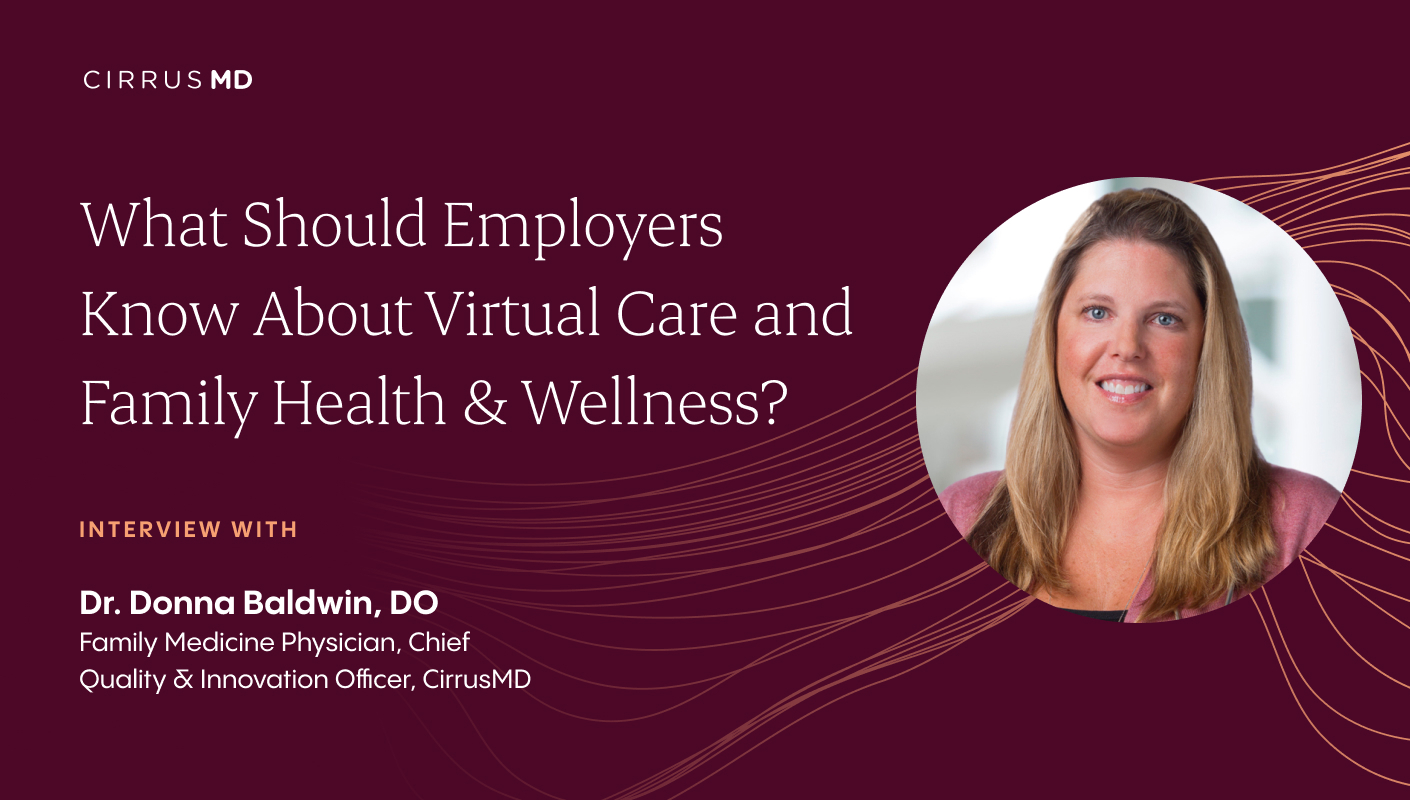Q: We often hear that employees don’t have a primary care physician. How does CirrusMD help?
A: A recent survey found that 28% of U.S. men and 17% of women don’t have a personal healthcare provider, and trends show people with a primary care physician (PCP) continue to decline. The reasons may range from the cost of care, even for patients with insurance, to the lack of local brick and mortar resources, to the inconvenience of waiting to schedule in-person appointments.
CirrusMD can help close this gap. Our clinical staff is made up of board-certified, primary and multi-speciality physicians, who are available to employees 24/7, on the patient’s schedule.
Most importantly, our providers are trained to take care of the whole person — from acute care needs to chronic care, as well as help people with prevention and wellness. Here’s a quick example:
A patient comes on the platform with a cough complaint. We’ll ask questions about fever and shortness of breath, and also, asthma and smoking.
We’ll make sure existing conditions — like asthma — are well controlled and help get the patient a prevention inhaler if needed.
If the patient smokes and is interested in quitting, we can provide suggestions around nicotine replacement and smoking cessation programs, and pair them with support tools offered by their employer.
Finally, we’ll provide medical advice about the cough and make a plan for follow-up.
Q: People talk about Virtual First. What does that mean?
A: Many savvy employers are looking at a virtual first approach to healthcare to help their employees — possibly because they don’t have a PCP, maybe just greater convenience.
A key problem we face today is that healthcare is so fragmented. Here’s an example: when urgent care models first surfaced, as a PCP, I found my patients would get care at an urgent care facility because they wanted care in that moment and didn’t want to wait for an appointment. They might get care there, then get follow-up care with me, and there wasn’t good coordination between providers. At CirrusMD, we’re committed to being a part of the existing healthcare ecosystem, not contributing to fragmentation. We’re part of the continuum of care.
With a good partner who can provide virtual first services, employers can also partner with other solutions in the ecosystem for comprehensive care that patients need. Then we can connect these together, so the patient can be treated more effectively and completely by other providers in the system.
Patients today have a lot of options, and left unchecked, it’s just further fragmentation waiting to happen. It’s hard for a patient to know what the right first step is to finding care. CirrusMD adds value by acting as the first stop in the care journey. Our physicians can assess what’s needed, and have the resources at their fingertips to help guide the patient with next steps.
Q: Does Virtual Care help employee retention?
A: We believe it does. We’re working with clients to measure retention across different employee segments (those based in retail stores, warehouses, corporate offices), and seeing evidence that utilization of an easy virtual care offering correlates to increased retention.
“In 6 distinct employee groups, the monthly turnover rate was 1 to 6 percentage points lower when the employee was engaged with CirrusMD. On average, a 40 percent difference in median turnover rates.” — From a recent CirrusMD study
Why? Because our providers can take care of patients who have insurance just as easily as those who don’t. There’s a convenience factor of being able to get care in the middle of a person’s workday, but also, actually having care. We’re seeing that employers who invest in all their employees see a return on their investments, both through cost and retention rates.
There’s also value when employees get early care instead of delaying care. Delayed care equals higher costs, more time off work.
Let's use a mental health example of untreated depression and anxiety. Left untreated, these conditions can lead to less productivity, more time off work, poor relationships with coworkers and colleagues, poor relationships with family members. These factors can just get worse, leading to the need for hospitalization. If we can offer care early, we can work to keep situations from getting worse.
In 6 distinct employee groups, the monthly turnover rate was 1 to 6 percentage points lower when the employee was engaged with CirrusMD. On average, a 40 percent difference in median turnover rates.”
CirrusMD study
Q: Today’s workforce is more heterogeneous than ever before. How can an employer provide benefits for all?
A: Employers are — in effect — managing multiple workforces. And employee benefits are only as good as their utilization. An employer needs to look for the benefits that can reach and serve a diverse workforce.
CirrusMD has a mission to serve those who feel underserved by the current healthcare system. Our solutions, and the care we provide, crosses the boundaries of age, race, gender, even language, and creates an unbiased way to deliver care. Patients often feel more open to chatting and texting, and not having to face a doctor in person, especially for things that may be more difficult to talk about.
I think it’s important to note that with so many women in the workforce, it often gets difficult to care for themselves as well as the others in their care, often ranging from their parents to their kids. It’s so important to first find time to take care of yourself. If you aren’t well, you can’t be a good caregiver.
For employers, this translates to understanding your employees’ total situation. When employers ask their employees what they want in terms of healthcare and related benefits, they’ll usually hear that it “needs to be easy, needs to be something I can do during my workday, needs to be in one place.” Think about employees going through a large book of benefits and trying to figure out where to start -- it can be pretty overwhelming. Let’s help your employees get to what matters most.







